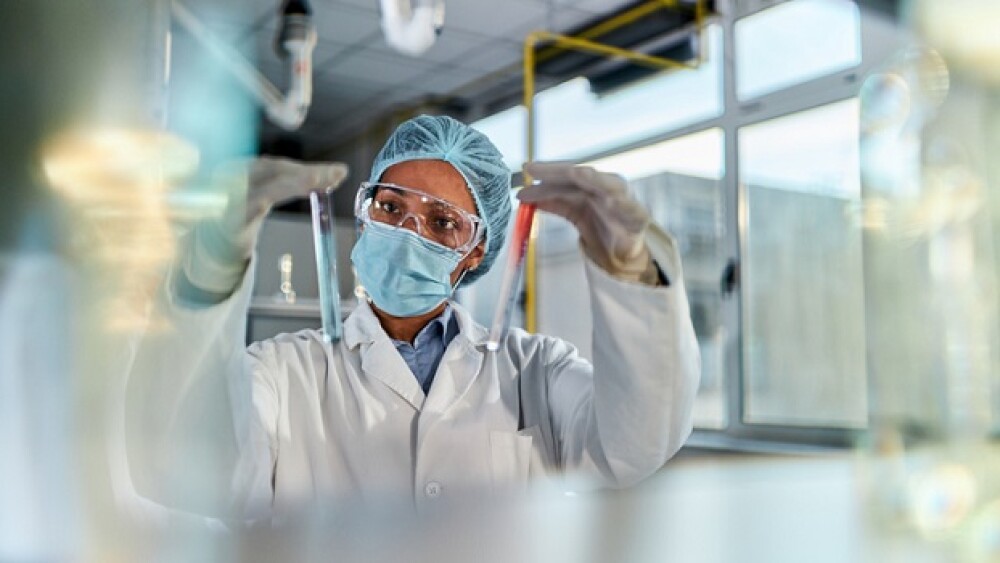Becoming a chemist in the biopharma industry takes hard work, dedication and a willingness to continuously learn. Here’s what you need to know to become a biochemist.
Courtesy of skynesher/Getty Images
Biochemists are a vital part of the biopharmaceutical industry. They develop and produce new medicines and therapies and test existing ones to ensure their safety and efficacy.
Each and every life-saving medication or treatment starts as an idea in a chemist’s mind and is brought to fruition through the application of scientific knowledge and skills, but their knowledge is not created in a vacuum. Rather, it builds on the work of others before them and is honed through academic study and professional experience.
Becoming a chemist in the biopharma industry requires a strong foundation in chemistry, as well as an understanding of the principles of biology and medicine. It also takes hard work, dedication and a willingness to continuously learn.
Here’s what you need to know to become a biochemist.
What is a Biochemist?
Where a traditional chemist might work in a laboratory testing the properties of different chemical compounds, a biopharmaceutical chemist focuses on developing new medicines and therapies or testing existing ones to ensure their safety and efficacy. This could be done through researching the structure and function of disease-causing agents, designing new drugs to target them, or developing new ways to deliver existing treatments.
Biopharmaceutical chemists also tend to specialize in a particular area of research, such as cancer, infectious diseases, or cardiovascular disorders. A biopharma chemist might even specialize in a specific type of drug, such as small-molecule drugs or biologics.
The work of a biopharmaceutical chemist is vital to the development of new medicines and treatments, and the advancement of human health.
How to Become a Biochemist
Becoming a biopharmaceutical chemist usually requires a bachelor’s degree in chemistry, followed by a Ph.D. in medicinal chemistry or a related field. Some chemists may also choose to pursue a Pharm.D. or M.D./Ph.D.
While a bachelor’s degree in chemistry is the minimum requirement for most entry-level positions, many research positions will require a Ph.D. In fact, most tenure-track academic positions will require a Ph.D. or equivalent terminal degree.
Pursuing a higher degree will not only give you the chance to specialize in a particular area of interest, but it will also provide you with the opportunity to gain hands-on experience in a research lab. This experience is essential for many chemists who wish to pursue a career in the biopharmaceutical industry as it will give you the chance to learn new techniques and apply your knowledge to real-world problems.
Soft skills are also important for chemists who wish to work in the biopharmaceutical industry.
These include:
- Strong communication skills: The ability to communicate complex scientific ideas to a non-scientific audience is essential in the biopharmaceutical industry.
- Critical thinking skills: Biopharmaceutical chemists need to be able to think critically about data and proposals in order to make sound decisions.
- Problem-solving skills: The ability to identify and solve problems is essential in the fast-paced world of biopharmaceutical research.
- Teamwork skills: Collaborating with other scientists is essential in the biopharmaceutical industry, as most projects are completed by teams of researchers.
What Makes a Biochemist Role Unique?
Biochemists play a vital role in the development of new medicines and therapies, and their work has the potential to impact the lives of millions of people. It is a demanding and challenging field, but it is also an incredibly rewarding one.
Unlike many other scientific disciplines, the work of a biopharmaceutical chemist is often directly applied to improving human health. This means that the discoveries made by biopharma chemists have the potential to save lives and improve the quality of life for patients.
It is also a field that is constantly evolving, as new technologies and techniques are developed. This means that there is always something new to learn, which can make the work both challenging and exciting.
Finally, the biopharmaceutical industry is a fast-paced and competitive one, which means that chemists need to be able to think quickly and make decisions under pressure. This can be both challenging and exhilarating if you thrive in a fast-paced environment.
Typical Career Path of a Biochemist
Throughout a biochemist’s career, they will be engaged in many different activities. The most common of these is research and development (R&D). Chemists working in biopharma companies engage in research to discover new molecules and develop new ways to create or use existing ones. They also work on developing new methods and processes to make these molecules more efficient and less expensive to produce.
In addition to R&D, chemists in biopharma also engage in quality control (QC) and quality assurance (QA). QC is responsible for ensuring that the products manufactured by the company meet all safety and quality standards. QA is responsible for ensuring that the manufacturing process itself is safe and efficient.
As a biochemist progresses in their career, they may also move into management or executive positions. In these roles, they will be responsible for overseeing the work of other chemists and making sure that the company’s products meet all regulatory requirements.
Average Salary of a Biochemist
According to US News & World Report, the average salary for a biochemist is $94,270. However, salaries can vary widely depending on experience, education, and location. For example, entry-level biochemists may earn $67,710 or less, while experienced biochemists may earn $127,980 or more.
It all comes down to your specific skill set and where you want to work. The biopharmaceutical industry is a global one, so there are opportunities to work in many different countries.
The Risks of Becoming a Biochemist
Like all jobs, working as a biochemist has its risks. The most common of these is the risk of exposure to hazardous materials. Chemists working with dangerous chemicals or substances must take precautions to protect themselves, such as wearing protective clothing and using safety equipment.
There is also the risk of exposure to radiation, as some chemicals emit harmful radiation. Chemists must take care to use these substances safely and protect themselves from exposure.
Finally, working in a fast-paced and competitive industry can be stressful. Chemists need to be able to make quick decisions and work well under pressure. This can lead to burnout if not managed properly.
Despite these risks, the rewards of working as a biopharmaceutical chemist make it a career worth considering. The work is directly applied to improving human health, and the discoveries made by chemists play a major role in the overall improvement of medical treatments. The work can be both challenging and exciting, and the salary is competitive.
With the right skill set, biochemists can have a successful and fulfilling career.





